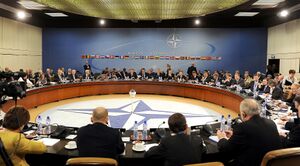North Atlantic Council
 | |
| Formation | 1949 |
| Parent organization | |
| Headquarters | Brussels, |
| Formally the most important decision-making body of NATO. | |
Not to be confused with the NATO connected deep state think tank Atlantic Council.
The North Atlantic Council (NAC) with its seat in Brussels (Belgium) is formally the most important decision-making body of NATO, endowed with political authority and decision-making power. It deals with all areas of alliance policy, with the exception of defense planning and nuclear policy.
From April 1952 to 1967 its seat was in Paris. It was established by Article 9 of the North Atlantic Treaty and it is the only body in NATO that derives its authority explicitly from the Treaty. The first meeting of the North Atlantic Council took place on September 17, 1949 in Washington DC, USA. [1] After France left the military part of the alliance, it moved to Brussels.
Powers and duties
The North Atlantic Treaty gave the NAC the power to set up subsidiary bodies for various policy functions, including a defense committee to implement other parts of the treaty. Since 1952, the NAC has been in permanent session.[2] The NAC can be held at the Permanent Representative Level (PermReps), or can be composed of member states' Ministers of State, Defense, or Heads of Government. The NAC has the same powers regardless of the formation under which it meets. The NAC meets twice a week: every Tuesday, for an informal lunch discussion; and every Wednesday for a decision-taking session. Usually, meetings occur amongst the Permanent Representatives who are the senior permanent member of each delegation and is generally a senior civil servant or an experienced ambassador (and holding that diplomatic rank). The list of Permanent Representatives may be found on the NATO website.[3]
The 30 members of NATO have diplomatic missions to the organization through embassies in Belgium. The meetings of the NAC are chaired by the Secretary General and, when decisions have to be made, action is agreed upon on the basis of unanimity and common accord. There is no voting or decision by majority. Each nation represented at the NAC table or on any of its subordinate committees retains complete sovereignty and responsibility for its own decisions.
Internal criticism
In connection with the Kosovo War - in the NATO briefing in spring 2002 - there was for the first time clear internal criticism of the dominance of the USA and the resulting significantly restricted role of the North Atlantic Council in decision-making. The air strikes against Yugoslavia were not planned in the Supreme Headquarters of NATO in Europe (SHAPE), but in the American Headquarters for the European command area. The then NATO Commander-in-Chief General Wesley Clark relied on a small group of officers in his decisions, almost all of whom belonged to the American headquarters. The multinational approval of the NATO Military Committee and the North Atlantic Council was only obtained in retrospect. [4]
References
- ↑ http://www.nato.int/cps/en/natolive/topics_49763.htm%7Cpublisher=NATO}}
- ↑ https://archives.nato.int/reorganization-of-north-atlantic-treaty-organization;isad
- ↑ http://www.nato.int/cps/en/natolive/who_is_who_39074.htm%7Ctitle=nato.int: "NATO Permanent Representatives"
- ↑ Guillaume Parmentier http://www.nato.int/docu/review/2002/issue2/german/art4.html The Renewal of the Alliance, In: NATO Review Spring 2002 No. 1.